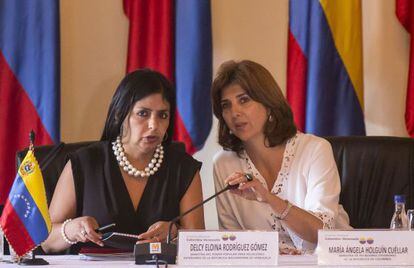Colombian and Venezuelan ministers meet to ease tension over border crisis
Despite friendly tone, representatives offer few specific solutions to their disputes

Appeasement. That was the ostensible goal of a long-awaited meeting between the Venezuelan and Colombian foreign ministers held in Cartagena de Indias on Wednesday to address the border crisis between their nations.
Colombian Foreign Minister María Angela Holguín said it was “the most frank and realistic one we have had recently.”
Her Venezuelan counterpart, Delcy Rodríguez, also used the word “frank” to describe a conversation that left her “satisfied.”
But at the joint public statement that followed the six-hour meeting, neither spoke of any substantial agreements nor did they announce a meeting between Presidents Juan Manuel Santos and Nicolás Maduro, a step which seemed imminent just a few hours before. Instead, they shared a list of pending matters and minimum procedural requirements.
Colombia has promised to launch a security campaign at the border
Despite expressing a spirit of cooperation in their brief presentation, there seemed to be a great divide between both sides when it comes to current issues, not to mention Venezuela’s wish to “reestablish the border” from scratch.
“No one is going to take us off the path of cooperation with Venezuela,” María Ángela Holguín said. The Colombian foreign minister acknowledged the damage that gasoline smuggling into Colombia and the entry of criminal gangs into Venezuela has done to the region.
The two countries agreed to allow the Colombian ombudsman to travel to the Venezuelan state of Táchira to accompany Venezuelan authorities as they round up the belongings of deported Colombian citizens. The ombudsmen from both countries will meet to design a protocol for these deportations.

Colombia promised to launch a security campaign at the border, which Holguín said she hoped would become a “bilateral” initiative once their defense ministers meet to coordinate efforts. Holguín and Rodríguez also discussed a possible meeting between their economy ministers to discuss the difference in exchange rates offered on both sides of the border, the main incentive for smuggling.
Holguín also reiterated her government’s call for Venezuela to open the border. “We do not believe this is the way to solve problems,” she said.
Venezuelan Foreign Minister Rodríguez, on the other hand, was more aggressive. She arrived at the meeting flanked by a committee of other high-level Venezuelan officials. Though she praised the open and cordial tone of their conversation “under this leafy almond tree” at the colonial Casa del Marqués de Valdehoyo, the Colombian Foreign Ministry’s office in Cartagena de Indias, she called on Holguín “to take control of the media question.”
According to Rodríguez, international media outlets have slandered Venezuela and its president and published stories of alleged abuse of some of the nearly 1,500 Colombian deportees. She compared the situation to the Rwandan tragedy in the 1990s when certain voices in the media fed the flames of hate. To avoid such harmful influences, both ministries have decided to keep direct channels of communication open, Rodríguez added.
Just minutes after Foreign Minister Rodríguez debriefed her meeting at Miraflores Palace in Caracas, her brother Jorge Rodríguez called for a “great march against imperialism” to take place on Friday in the capital. Jorge Rodríguez is the mayor of Libertador, a working-class municipality in the midwest of Caracas.
Jorge Rodríguez seemed to be speaking on behalf of the chavista administration this Wednesday when he took up the border issue. He launched a Twitter campaign to call for respect for Venezuela under the hashtag #VenezuelaExigeRespeto (Venezuela Demands Respect).
While at the presidential palace, he tweeted some especially harsh criticism of César Gaviria, ex-Colombian president and former secretary general of the Organization of American States (OAS) after the latter asked for Colombia to leave Unasur. The South American organization is led by Ernesto Samper, a Colombian national who often defends the actions of the Venezuelan regime, according to Gaviria.
Translation by Dyane Jean François










































